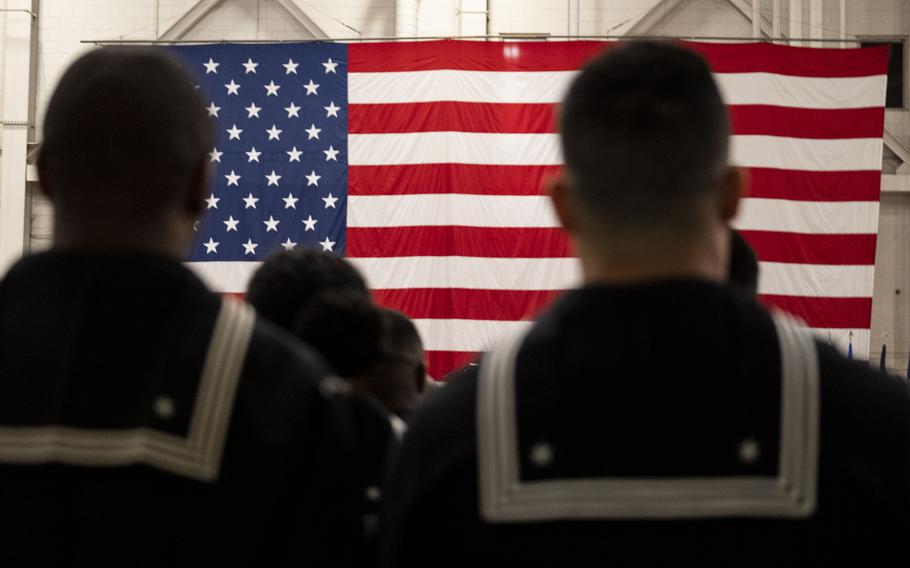
Sailors at Naval Station Norfolk in Norfolk, Virginia on Feb. 3, 2023. (Billy Schuerman/The Virginian-Pilot/TNS)
(Tribune News Service) — New legislation introduced by U.S. Rep. Jen Kiggans would work with the Navy to tackle systemic problems uncovered by the suicides of local sailors.
Kiggans, a Republican who represents the 2nd District, introduced last week the Sailor Standard of Care Act, what she calls a “bipartisan solution” to improve mental health care for sailors. She championed the legislation in response to the suicides of seven Hampton Roads-based sailors last year. The tally for 2023 already is at two.
“It infuriates me that the number of sailors who die by suicide continues to rise,” Kiggans said.
The act was introduced May 16 — one day before the Navy released a comprehensive investigation into command climate aboard the USS George Washington and sailor quality of life unique to a shipyard environment following three suicides within a week. The Navy also released an investigation into four suicides linked to Norfolk’s Mid-Atlantic Regional Maintenance Center (MARMC), ultimately finding the deaths were not connected.
While the Navy found no one person was responsible for the deaths at either command, leadership said the Hampton Roads-based suicides reflect a failure in maintaining a suitable Navy standard.
“In both cases there was an organizational drift — a slow erosion over time — conditions that were clearly not right became acceptable,” reads a memorandum signed by Adm. Michael Gilday, chief of naval operations, and Carlos Del Toro, secretary of the Navy. The memo was released May 17.
If it becomes law, the Sailor Standard of Care Act would implement an increase of mental health resources to commands with more than 15 sailors on limited duty and create an online dashboard to track sailor quality of life. It also calls for a study into reimbursement rates for private providers under TRICARE.
“We look at recruitment, we look at retention — the suicides are just one issue but how are we not providing for our military men and women and their families? I think the most important place to start is addressing mental health care,” Kiggans said.
Additionally, the act would require sailors on limited duty to undergo a mental health screening when they begin limited duty and every 60 days after that. And it would work to identify inefficiencies in the Navy’s medical separation process by requiring the Navy to provide briefings to the House Armed Services Committee.
The medical separation process is intended to take 230 days from start to finish, but the MARMC investigation found the process averages 360.
The extensive wait time was noted in the investigation facts of three of the four MARMC sailors who died by suicide. The referral to the disability evaluation system, the initial step in a medical separation, should take seven days. But it took 216 days for Cameron Armstrong; 151 days for Deonte Autry; and 45 days for Janelle Holder.
“Just keeping people guessing about what their future holds is not healthy, it’s especially not good for anyone’s mental health,” Kiggans said.
The legislation will now begin its way through Congress. It is supported by Reps. Rob Wittman, R-1st District, and Bobby Scott, D-3rd.
The investigation into the sailor quality of life at shipyards and the MARMC-related suicides came with 48 and 23 recommendations, respectively. According to a memo on “setting a new course for Navy quality of service,” the Navy will work for the next three months to identify a definitive timeline on when all recommendations would be implemented.
Some long-term solutions will require congressional funding or authorization, of which Kiggans said she is ready to help secure funding and prioritize top issues.
“I was able to speak with Admiral (Daryl) Caudle and the Master Chief Petty Officer of the Navy (James Honea) and let them know I want to partner with them, you know — what do you need from Congress to be able to implement your findings?” Kiggans said.
Resources for service members and veterans struggling with mental health, including 24-hour crisis hotlines, can be found below:
The Military Crisis Line: call 1-800-273-8255, ext. 1; or text “273Talk” to 839863
Military OneSource: 1-800-342-9647
National Suicide Prevention Lifeline: 988 — call or text
©2023 The Virginian-Pilot.
Visit pilotonline.com.
Distributed by Tribune Content Agency, LLC.